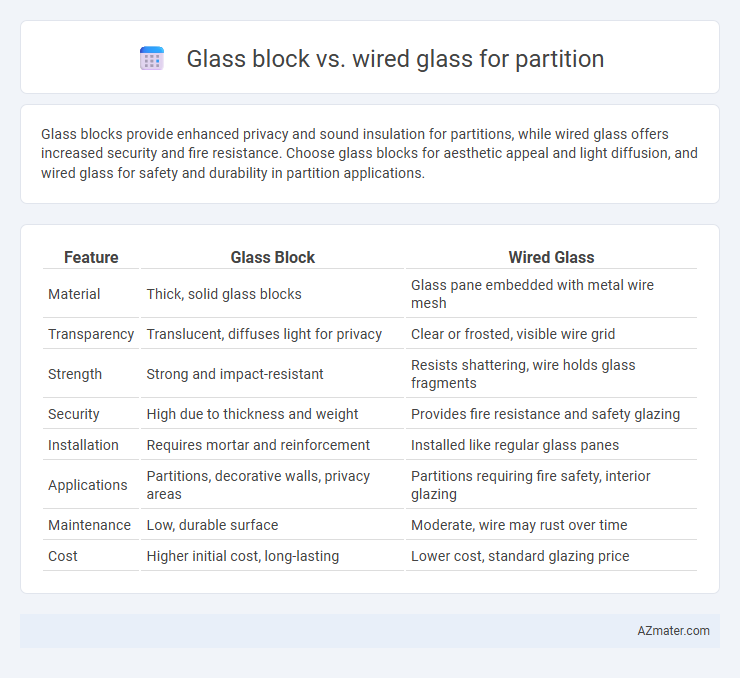Glass blocks provide enhanced privacy and sound insulation for partitions, while wired glass offers increased security and fire resistance. Choose glass blocks for aesthetic appeal and light diffusion, and wired glass for safety and durability in partition applications.
Table of Comparison
| Feature | Glass Block | Wired Glass |
|---|---|---|
| Material | Thick, solid glass blocks | Glass pane embedded with metal wire mesh |
| Transparency | Translucent, diffuses light for privacy | Clear or frosted, visible wire grid |
| Strength | Strong and impact-resistant | Resists shattering, wire holds glass fragments |
| Security | High due to thickness and weight | Provides fire resistance and safety glazing |
| Installation | Requires mortar and reinforcement | Installed like regular glass panes |
| Applications | Partitions, decorative walls, privacy areas | Partitions requiring fire safety, interior glazing |
| Maintenance | Low, durable surface | Moderate, wire may rust over time |
| Cost | Higher initial cost, long-lasting | Lower cost, standard glazing price |
Introduction to Glass Block and Wired Glass
Glass block and wired glass are popular choices for partitions, each offering unique structural and aesthetic benefits. Glass blocks provide enhanced privacy and insulation with their thick, translucent design, making them ideal for creating visually appealing and noise-resistant barriers. Wired glass incorporates embedded metal mesh for added safety and fire resistance, commonly used in settings where security and durability are critical.
Material Composition and Structure
Glass block partitions consist of thick, solid glass units formed by fusing two glass halves to create a hollow core that enhances insulation and soundproofing. Wired glass incorporates a mesh of galvanized steel wire embedded within the glass during the manufacturing process, providing added fire resistance and safety by holding shards intact upon breakage. The structural design of glass blocks prioritizes transparency and thermal efficiency, whereas wired glass emphasizes impact resistance and fire-retardant properties.
Aesthetic Appeal and Design Flexibility
Glass block offers a smooth, translucent surface that enhances natural light diffusion while maintaining privacy, making it ideal for modern partitions that prioritize aesthetic appeal. Wired glass features embedded metal mesh, providing a textured, industrial look that adds design versatility and a distinctive visual interest to interior spaces. Both materials enable unique design possibilities but differ in style emphasis, with glass block leaning towards sleek elegance and wired glass offering rugged architectural character.
Light Transmission and Privacy
Glass blocks offer high light transmission with their translucent nature, allowing natural light to pass through while ensuring moderate privacy due to their textured surfaces. Wired glass provides enhanced safety with embedded wire mesh but typically reduces light transmission compared to glass blocks, making it less ideal for bright partitions. For optimal balance between privacy and illumination, glass blocks are preferred in partition applications where light diffusion is crucial.
Strength and Impact Resistance
Glass block offers superior strength and impact resistance due to its thick, solid construction that effectively distributes force, making it ideal for partition walls needing high durability and security. Wired glass contains embedded wire mesh that provides additional safety by holding shards together upon breakage, but it is generally less resistant to heavy impacts compared to glass block. For partitions requiring maximum protection against strong impacts and long-term structural integrity, glass block is typically the preferred choice.
Fire Safety and Building Codes
Glass block offers superior fire resistance, often complying with fire-rating requirements in building codes due to its thickness and solid construction, making it a reliable choice for partitions in fire safety zones. Wired glass, embedded with metal wire mesh, can resist heat to a degree but generally falls short of the stringent fire-resistance ratings required by modern building codes and may shatter under extreme heat. Building codes such as the International Building Code (IBC) often specify fire-resistance ratings and may favor or require fire-rated glass blocks over wired glass for partitions in egress routes and fire barriers.
Sound Insulation Properties
Glass blocks provide superior sound insulation compared to wired glass due to their thick, hollow construction that effectively reduces noise transmission. Wired glass, although reinforced for safety and impact resistance, offers minimal acoustic dampening since its thinner, solid pane allows more sound to pass through. For partitions requiring efficient soundproofing, glass blocks are the more effective choice to maintain acoustic privacy.
Installation Process and Maintenance
Glass block partitions require precise alignment and sealing during installation to ensure structural integrity and sound insulation, often needing mortar or specialized adhesives. Wired glass installation involves framing within metal or wooden supports, demanding careful handling due to its embedded wire mesh that enhances safety but complicates cutting and fitting. Maintenance of glass blocks is straightforward with periodic cleaning and grout inspection, whereas wired glass requires regular checks for wire mesh corrosion and potential glass cracks to maintain its fire-resistant properties.
Cost Comparison and Budget Considerations
Glass blocks typically cost between $15 and $30 per square foot, making them a more budget-friendly option for partition walls compared to wired glass, which ranges from $20 to $45 per square foot due to its reinforced safety features. Installation expenses for glass blocks are generally higher because of the labor-intensive process, while wired glass offers simpler installation, potentially lowering overall costs. When planning a project budget, consider not only material prices but also safety requirements and long-term maintenance, as wired glass may reduce insurance premiums and enhance durability.
Best Applications for Partitions
Glass block provides excellent sound insulation and privacy, making it ideal for partition walls in bathrooms, offices, and residential spaces where natural light and visual separation are essential. Wired glass offers superior fire resistance and safety, suitable for partitions in industrial settings, schools, and commercial buildings requiring fire-rated barriers. For partitions requiring a combination of light transmission, security, and thermal performance, glass block is preferred, while wired glass is chosen primarily for its fire-resistant properties.

Infographic: Glass block vs Wired glass for Partition
 azmater.com
azmater.com